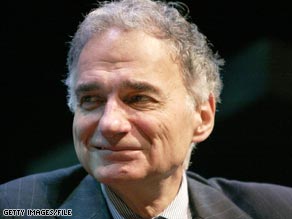Several of Congress' most prominent Jewish members are set to go after John McCain on an issue of perceived strength: his proclaimed "toughness" in dealing with Iran.
On Thursday, Sens. Frank Lautenberg and Ben Cardin, alongside more than half-a-dozen members of the House of Representatives and the National Jewish Democratic Council, will host a press conference highlighting a vote McCain made that helped corporations like Halliburton continue doing business with sanctioned countries like Iran.
The vote, McCain's critics argue, demonstrates a strand of political hypocrisy -- on the campaign trail, the Senator has repeatedly called for divestment from Iran -- and pokes holes in his attacks on Barack Obama.
"John McCain has been arguing that he is Mr. Tough Guy on Iran," said Ira Forman, Executive Director of the NJDC. "At the AIPAC conference he talked about how he would introduce stronger sanctions and boycott measures. He's also saying Obama is naïve and can't be trusted to deal with the Iranians. But when it came to deciding to be tough on Iran or supporting Halliburton, he stuck with Halliburton. It is easy to talk the talk but it is not so easy to walk the walk."
In July 2005, Sen. Lautenberg introduced an amendment to the Defense Authorization bill that would have closed a loophole allowing U.S. corporations to do business with terrorist-sponsoring nations by setting up foreign shell companies. The measure had broad support as it became evident that several major companies, including Halliburton, had taken advantage of the system. Frank Gaffney, the neoconservative columnist, opined that the situation was an "affront to the letter and spirit of the law."
But when the provision came to the floor, the vote split almost entirely down party line. Only two GOP Senators supported the amendment and neither had the last name McCain.
Soon thereafter, a less-stringent amendment was passed, roughly reinstating the legal status quo. As a Democratic aide noted, "it allowed Republicans to cover themselves on the issue." The Center for Security Policy wrote:
"The [GOP version] would seek to penalize individuals or entities who evade [International Emergency Economic Powers Act] sanctions - if they are "subject to the jurisdiction of the United States." This is merely a restatement of existing regulations. The problem with this formulation is that, in the process of purportedly closing one loophole, it would appear to create new ones... If the Senate is serious about truly closing this loophole, it must adopt the Lautenberg Amendment."
Now, three years later, Lautenberg, Cardin, the NJDC and others are trying to extract a political price from McCain for not supporting their legislation. And, as some Jewish politics observers suggested, there could be political room to operate.
"The bottom line is this," said Mark Mellman, President & CEO of The Mellman Group. "There is an obviously grave concern in the American Jewish community about a nuclear Iran. This is a leadership that has pledged to wipe out Israel and is developing the means to do that. And so there is grave concern within the Jewish community but also outside the Jewish community."
It is a Rovian effort -- going after an opponent's perceived strength. After all, McCain has made the concept "getting tough" on hostile regimes a central thrust of his foreign policy. During a speech at AIPAC he spoke directly about the benefits of cutting off Iran's financial pipelines.
"As more people, businesses, pension funds and financial institutions across the world divest from companies doing business with Iran, the radical elite who run that country will become even more unpopular than they are already," he said.
And the Senator has often backed his rhetoric with action. In 1992, McCain coauthored the Iran-Iraq Arms Non-Proliferation Act, which prohibited the transferring for weapons or technology to those two countries. More recently, he has championed the Lieberman-Kyl amendment, which designated the Iranian Revolutionary Guard a terrorist organization. In fact, in 2006, McCain tried to have Iran banned from participating in the World Cup soccer tournament.
All this Forman acknowledged. But he added, "when you are the guy who says 'I am tough, I will be the one who will extend sanctions against Iran, and my opponent is weak' -- when you run your campaign in the Jewish community around this point, you are particularly vulnerable when you didn't do what you said you will."
As demonstrated by the Lautenberg amendment, McCain's resume isn't entirely without weak points. This list include his campaign staff, which currently includes Charlie Black, whose firm was paid $60,000 to lobby on behalf of the Chinese oil conglomerate doing business in Iran; and Carly Fiorina, who as CEO saw her company Hewlett-Packard trade with the Iranians.



